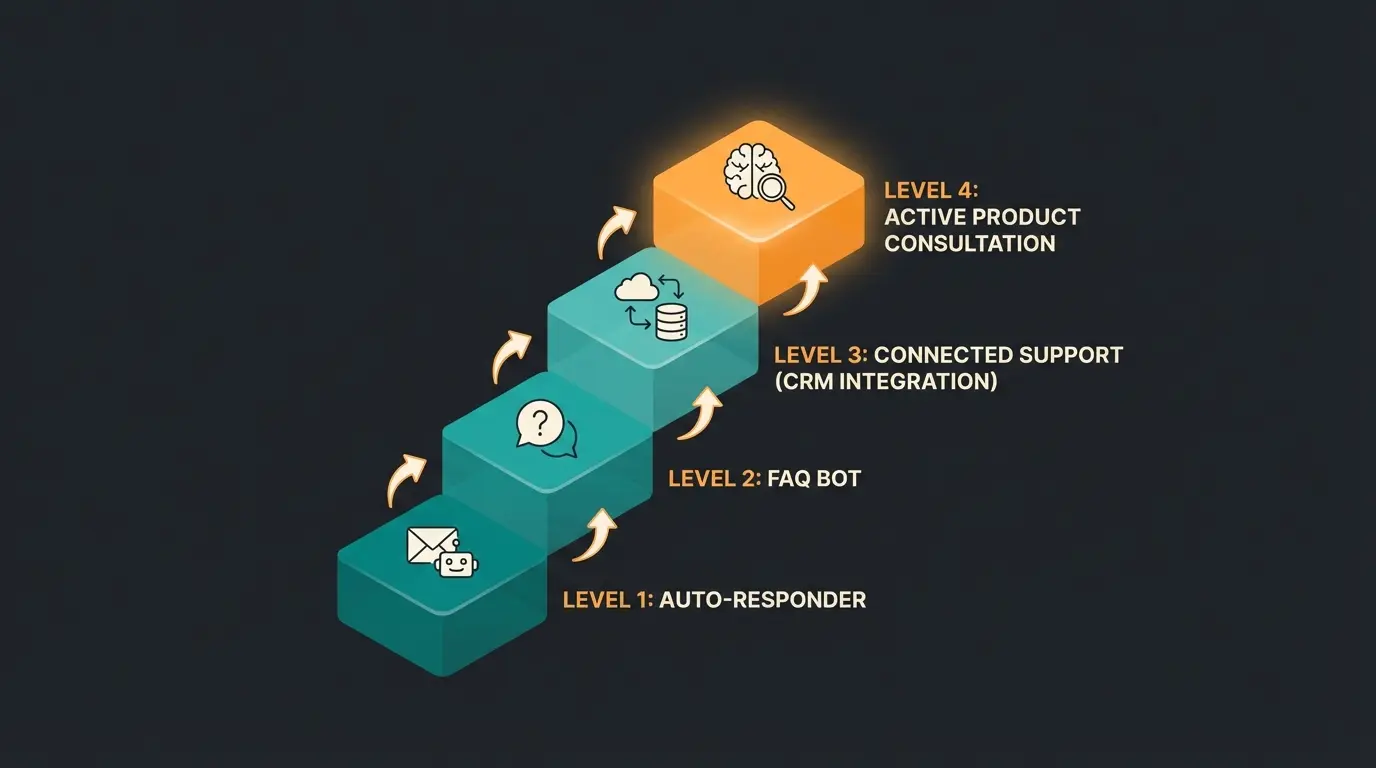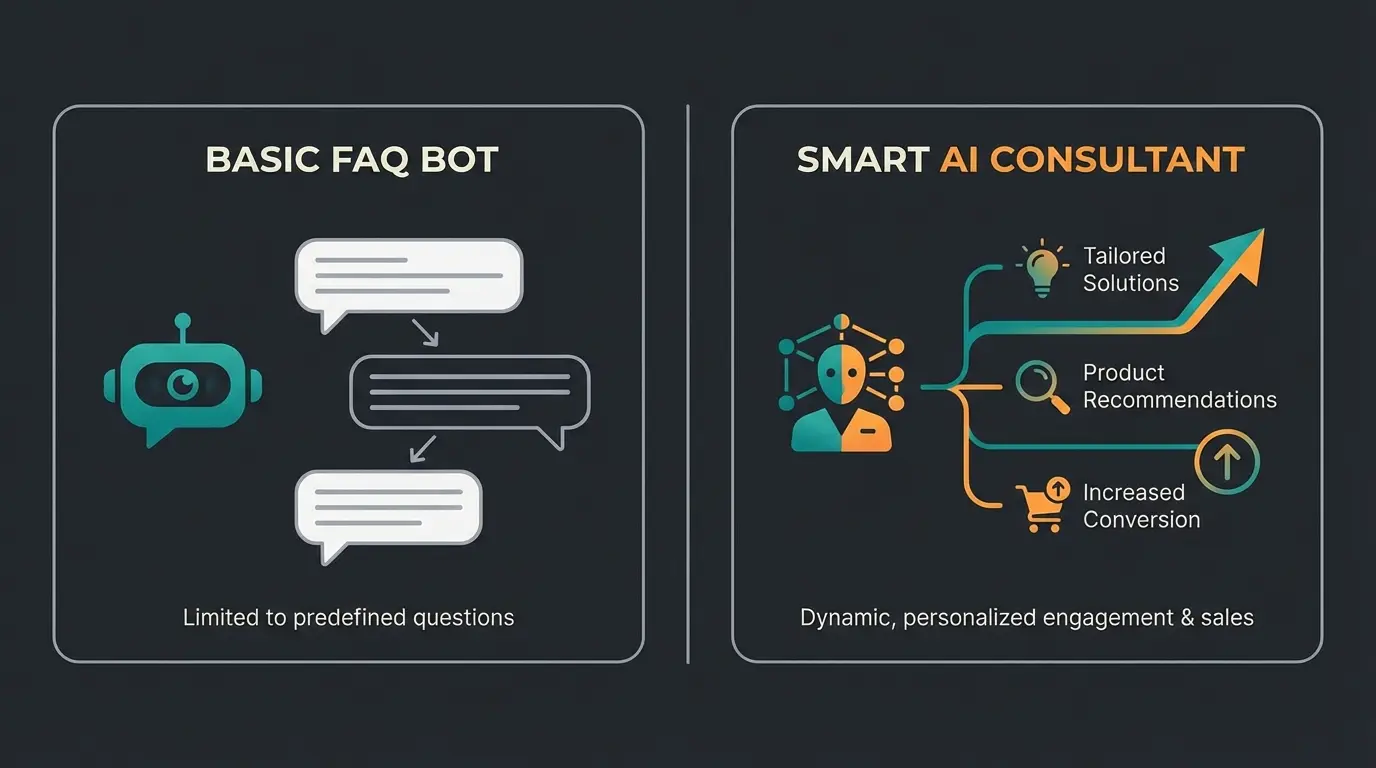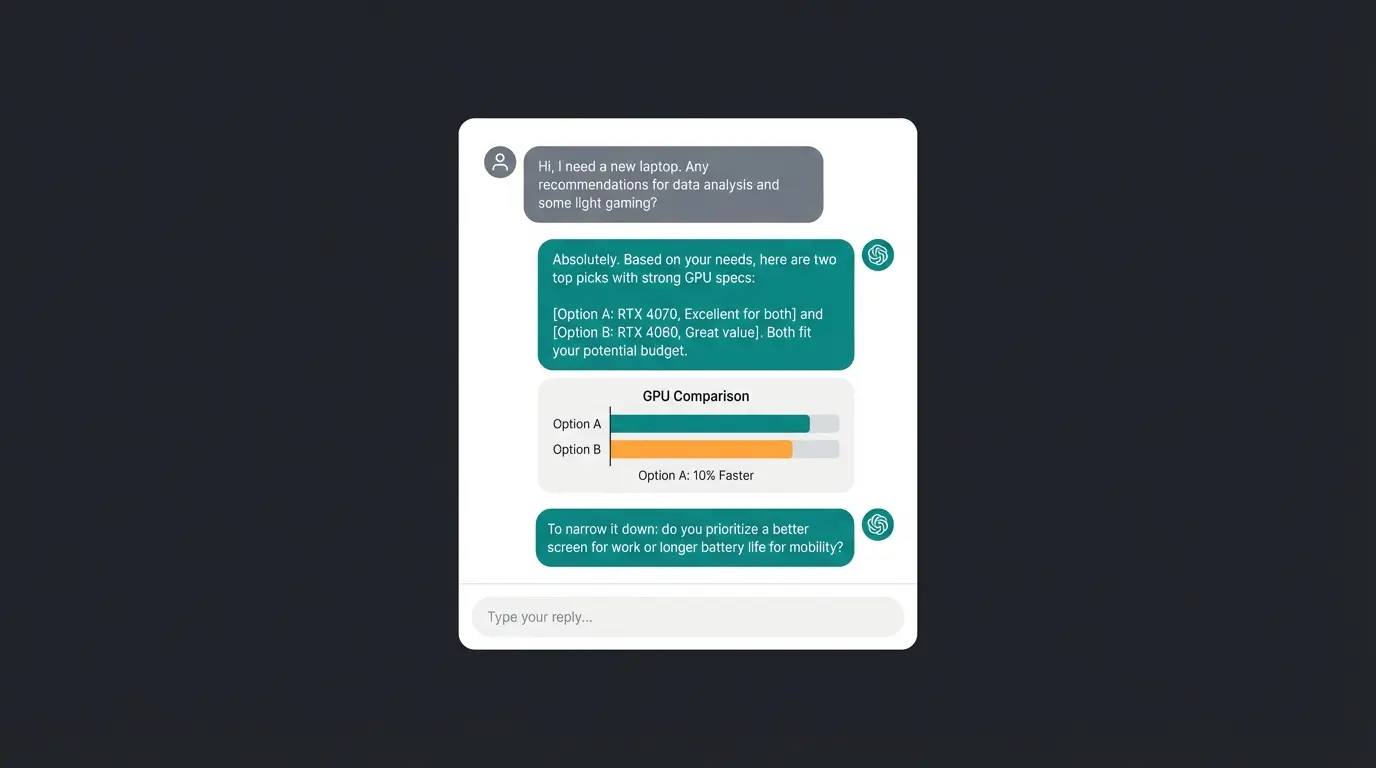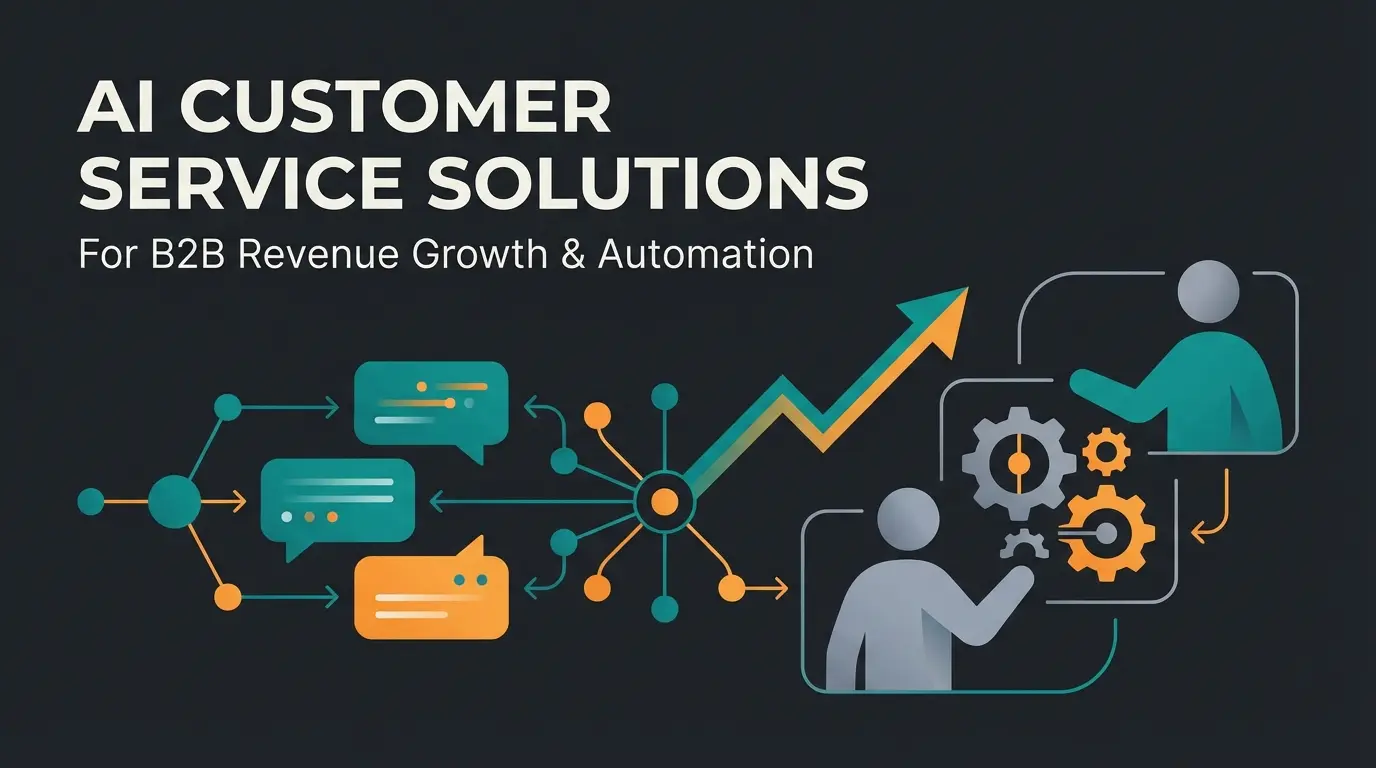Introduction: Beyond Cost Cutting to Revenue Generation
The integration of AI in customer service offers German companies enormous potential—not just for cost reduction, but increasingly for revenue generation through intelligent consultation. According to current market data from Botpress, companies can reduce their support costs by up to 70% through AI-powered solutions. This impressive figure is based on analysis of over 1,000 companies that have already implemented AI systems in customer service.
However, here's what most articles won't tell you: while competitors focus exclusively on cost reduction, forward-thinking companies are discovering that AI customer service can do much more than deflect inquiries. It can actively drive revenue through proactive product consultation—essentially creating a digital sales consultant available 24/7.
The cost structure in traditional customer service is often inefficient: an average support agent can handle about 50-60 customer inquiries per day. Studies show that AI systems can handle the same number of inquiries in less than an hour—with consistent quality and significantly lower costs per interaction. But the real opportunity lies in what happens next: converting those interactions into sales opportunities.
What's particularly remarkable is the technology's evolution: modern AI systems achieve success rates of over 90% when automatically answering standard inquiries. This leads to significant relief for service teams and allows companies to strategically deploy their personnel resources for more complex tasks—including high-value product consultations that drive conversions.
What Is AI in Customer Service Really?
AI in customer service is based on advanced algorithms and machine learning. Modern AI systems can understand natural language, analyze customer concerns, and suggest appropriate solutions. The technology has evolved from simple rule-based systems to intelligent assistants that continuously learn from interactions.
The Critical Distinction: Reactive vs. Proactive AI
Most existing content assumes 'Service' equals 'Complaint Handling' or 'FAQ.' But there's a crucial distinction that separates basic automation from true competitive advantage:
| Aspect | Reactive AI (FAQ Bots) | Proactive AI (Product Consultation) |
|---|---|---|
| Primary Goal | Deflect inquiries, reduce ticket volume | Drive sales, increase conversion rate |
| Technology | Keyword scripts, decision trees | Large Language Models (LLMs), contextual understanding |
| User Experience | Processed, transactional | Understood, personalized |
| Key Metric | Cost per ticket, deflection rate | Conversion rate, basket size, NPS |
| Example Use Case | 'What is your return policy?' | 'Which laptop suits my video editing needs under €1,000?' |
| Value Creation | Cost center optimization | Revenue driver, profit center |
This distinction is fundamental. Traditional chatbots shine at status updates, returns processing, and password resets. But modern AI can analyze user needs and suggest products—essentially treating every web visitor like they walked into a premium store with a personal consultant.
Key AI Technologies Overview
The most important AI technologies powering modern customer service include:
- Natural Language Processing (NLP) for understanding spoken and written language with nuance and context
- Machine Learning for continuous improvement based on interaction patterns
- Automatic Classification of customer inquiries for intelligent routing
- Predictive Analytics for proactive support and anticipating customer needs
- Large Language Models (LLMs) enabling complex, multi-turn consultative conversations
The Benefits: Beyond Cost Reduction
Market development in 2024 shows a clear trend toward AI integration: over 60% of German companies are planning to introduce or expand AI-powered customer service solutions. Pioneers in this field include e-commerce companies and financial service providers that have already achieved average cost savings of 45% through AI implementation.
Maximum support cost savings achievable with AI automation
Reduction in average customer response times
Automatic resolution of standard inquiries
Typical payback period for AI implementation
Successful practical examples can be found at leading companies like Deutsche Telekom and Otto, which have reduced their response times by 80% through AI-powered customer service systems while simultaneously increasing customer satisfaction. These successes are based on the skillful combination of automated processes and human expertise.
The Revenue Angle: Scalable Personalization
While others promise to cut support costs by 30%, the real opportunity lies in increasing basket size and conversion rate through intelligent product consultation. This appeals to Sales Directors, not just Support Heads. Consider the difference:
This shift from reactive deflection to proactive consultation represents a fundamental change in how businesses should view customer service—not as a cost to be minimized, but as a revenue opportunity to be maximized.

AI Technologies for Cost Savings and Revenue Growth
The integration of modern AI technologies opens up significant opportunities for cost reduction in customer service. AI-powered customer service solutions offer average cost savings of 50-70% compared to traditional support models—while simultaneously creating new revenue opportunities.
Intelligent Chatbot Systems
Advanced chatbot systems with Natural Language Processing (NLP) play a central role. These systems can automatically process up to 80% of standard inquiries. The AI analyzes the customer inquiry, recognizes the intention, and delivers appropriate answers from the knowledge database. But more importantly, modern LLM-based systems can handle complex, multi-turn consultations that were previously impossible for automated systems.
The key difference between old 'keyword script bots' and modern Large Language Models lies in contextual understanding. When a customer asks 'Which ski boot fits my riding style?', an old bot would trigger keywords and return generic information. A modern AI consultant asks follow-up questions about skill level, terrain preference, and foot shape—just like a human expert would.
Automated Email Processing
AI-powered email systems automatically categorize and prioritize incoming messages. The technology recognizes recurring inquiries and answers them independently. For more complex cases, relevant information is prepared for employees, reducing processing time by up to 40%. This allows human agents to focus on high-value consultation opportunities that drive revenue.
Machine Learning for Process Optimization
Machine learning algorithms continuously analyze support data and identify optimization potential. They recognize patterns in customer inquiries and develop precise solution suggestions. The insights gained flow directly into improving support processes—and increasingly, into identifying sales opportunities hidden within support interactions.
Cost Analysis and Savings Potential
The cost savings through AI in customer service can be quantified concretely. A detailed analysis shows the most important savings potential:
- Personnel Costs: Reduction of 30-50% through automation of standard inquiries
- Processing Time: Reduction of an average of 60% per customer inquiry
- Availability: 24/7 service without additional costs for shift work
- Scalability: Cost-effective handling of demand peaks without overtime or temporary staff
Return on Investment (ROI)
The ROI of AI solutions in customer service typically becomes apparent within the first 6-12 months. Companies report cost savings between €25,000 and €250,000 annually, depending on their size and inquiry volume. However, when you factor in revenue gains from improved conversion rates through better consultation, the ROI picture becomes even more compelling.
Qualitative Benefits Beyond Savings
In addition to direct cost savings, companies benefit from higher customer satisfaction through faster response times and consistent service quality. This leads to increased customer loyalty and reduces long-term acquisition costs. The impact on Net Promoter Score (NPS) and conversion rate can be equally significant as the direct cost savings.
Discover how AI-powered product consultation can reduce costs while boosting conversions. See the difference between basic chatbots and intelligent digital consultants.
Get Started FreeChoosing the Right Software: Support vs. Consultation
When selecting AI customer service software, it's crucial to understand what you're actually trying to achieve. The market offers fundamentally different categories of solutions:
Category 1: Ticket-Focused Solutions
Tools like Zendesk and Freshdesk excel at routing, ticketing automation, and agent copilot features. These are ideal for companies whose primary goal is support ticket resolution and cost reduction. They focus on deflection—efficiently handling inquiries so human agents don't have to.
Category 2: Simple FAQ and Messaging Bots
Solutions like Moin.ai and basic WhatsApp chatbots handle simple, scripted interactions well. They work for companies with predictable, repetitive inquiries that can be handled with decision trees. Based on benefits documented by chatbot providers, these solutions deliver solid ROI for basic automation needs.
Category 3: Product Consultation Solutions
This emerging category focuses on proactive sales assistance rather than reactive support. These solutions integrate with PIM (Product Information Management) and shop systems—not just CRM—to provide knowledgeable product recommendations that drive conversions.
Selection Checklist
When evaluating AI customer service solutions, consider these key factors:
- Integration Capability: Does it connect with your PIM/shop system, not just CRM?
- Conversation Depth: Can it handle complex, multi-turn consultative dialogues?
- Revenue Metrics: Does it track conversion rate and basket size, not just ticket deflection?
- Learning Capability: Does it improve recommendations based on successful sales patterns?
- Human Handoff Logic: Is escalation designed for sales consultation, not just support escalation?
Challenges, GDPR Compliance, and Risk Management
Implementing AI in customer service comes with important considerations, particularly for the German market where data protection requirements are stringent.
Addressing AI Hallucinations
One significant risk with AI systems is 'hallucination'—the AI generating incorrect or fabricated information. This is particularly dangerous in product consultation where wrong recommendations can lead to returns, complaints, or legal issues. Modern solutions address this through RAG (Retrieval-Augmented Generation) technology, which grounds AI responses in verified product data rather than generating information freely.
Germany-Specific Data Privacy (DSGVO/GDPR)
For the German market, GDPR compliance is non-negotiable. Key considerations include:
- Data processing agreements with AI vendors
- Clear disclosure to customers that they're interacting with AI
- Data minimization—collecting only what's necessary for the consultation
- Right to human contact—customers must be able to request human assistance
- Secure data handling and storage within EU jurisdictions

Practical Implementation Guide
A successful integration of AI solutions in customer service requires a structured approach. The systematic implementation of AI systems forms the basis for sustainable cost savings and revenue growth.
Step-by-Step Implementation
The integration begins with a thorough analysis of existing support processes. Core areas are identified where AI can deliver the greatest value—both for cost reduction and revenue generation. Technical integration occurs parallel to employee training to ensure a smooth transition.
Evaluate current support processes, identify automation potential, and map customer journey touchpoints where consultation drives conversions
Define clear goals for both cost savings AND revenue metrics, select appropriate AI solution category based on primary objectives
Deploy AI in selected areas, establish baseline metrics, train initial knowledge base with product information
Prepare teams for AI collaboration, define new roles focusing on complex consultations and AI supervision
Expand to additional areas, continuously improve based on conversion data and customer feedback
System Integration and Data Migration
The technical integration of AI systems requires careful coordination with existing CRM and ticketing systems. Particularly important is the migration of existing customer inquiries and FAQ data, which serve as training foundations for the AI. For consultation-focused implementations, integration with product information management (PIM) systems is equally critical.
Key integration points include:
- CRM systems for customer information and history
- Ticketing systems for inquiry processing and escalation
- Knowledge databases for consistent answers
- Analytics tools for performance measurement
- PIM/Shop systems for product consultation capabilities
Employee Training and Change Management
A decisive success factor is the early involvement of employees. Training programs convey the necessary competencies for working with AI tools and promote acceptance of new technologies within the team. This includes:
- Training on operating the new systems
- Understanding AI functions and limitations
- Clarification of new roles and responsibilities—particularly the shift toward high-value consultation
- Motivation around AI as an enabler, not a replacement
Continuous Monitoring and Optimization
After implementation, continuous monitoring is required. KPIs such as response times, resolution rates, and customer satisfaction are regularly evaluated and used for fine-tuning AI systems. For consultation-focused implementations, track conversion rates, average order value, and revenue attributed to AI-assisted interactions.
Practical Examples and Case Studies
Concrete examples demonstrate the effectiveness of AI in customer service. Successful implementations document significant cost savings alongside revenue improvements.
Documented Success Stories
Various industries report positive results from AI customer service implementation:
- E-Commerce: 40% cost reduction in first-level support, 15% increase in conversion rate through better product recommendations
- Telecommunications: 60% faster response times, improved upselling success rates
- Financial Services: 50% fewer routine inquiries for employees, higher customer satisfaction scores
Key Success Factors from Practice
Analysis of successful implementations reveals central success factors:
- Clear Objectives when introducing AI systems—define both cost AND revenue targets
- Step-by-step Integration to minimize risks and allow for learning
- Focus on measurable results across multiple dimensions
- Continuous Improvement through feedback loops and performance monitoring
Avoiding Common Mistakes
From these experiences, important lessons can be drawn for new projects. Common pitfalls include insufficient AI system training, lack of employee involvement, missing success metrics, and—critically—focusing only on cost reduction while missing revenue opportunities. Set realistic expectations for AI capabilities and plan adequate resources for implementation.

The Future: From Cost Center to Profit Driver
AI technology in customer service continues to evolve rapidly. New application areas like Predictive Support and automated quality analysis will further increase efficiency. But the most significant shift is conceptual: viewing customer service AI not merely as a cost-cutting tool, but as a revenue-generating asset.
Hyper-Personalization and Proactive Service
The future belongs to AI that doesn't wait for customers to ask questions, but proactively offers relevant assistance based on browsing behavior, purchase history, and contextual signals. This represents the ultimate evolution from reactive support to proactive consultation—treating every digital interaction as an opportunity for personalized engagement.
Companies that set the course now for a future-oriented customer service strategy—one that balances cost efficiency with revenue generation—will secure a significant competitive advantage. The question is no longer whether to implement AI in customer service, but whether you're using it merely for deflection or for active consultation that drives growth.
Checklist for Successful AI Integration
A structured approach is decisive for successful AI implementation in customer service. Based on practical experiences, we recommend the following steps:
- Analyze existing support processes and cost structure, identifying both cost centers and revenue opportunities
- Define Strategy with clear goals for cost savings AND revenue metrics
- Select Solution matching your company requirements—consider consultation capability, not just automation
- Train Employees to work effectively with AI systems, emphasizing their evolving role toward high-value interactions
- Establish Monitoring with regular tracking of both cost savings AND conversion improvements
- Iterate Continuously based on performance data and customer feedback
With the right strategy and professional implementation, companies can achieve sustainable cost savings through AI in customer service while significantly improving their service quality and—crucially—their revenue performance.
Frequently Asked Questions
Implementation costs vary significantly based on solution complexity and company size. Basic FAQ chatbots may start at €200-500/month, while comprehensive consultation-focused AI solutions range from €1,000-5,000/month. Most companies achieve ROI within 6-12 months, with annual savings of €25,000-€250,000 depending on inquiry volume. The key is to factor in revenue gains from improved conversion rates, not just cost savings.
AI augments rather than replaces human agents. While AI handles routine inquiries (up to 80% of volume), humans remain essential for complex issues, emotional situations, and high-value consultations. The most successful implementations shift human agents toward higher-value work—complex problem-solving and consultative selling—rather than eliminating positions.
The best tool depends on your primary goal. For ticket automation, Zendesk and Freshdesk excel. For simple FAQ handling, Moin.ai is popular. For product consultation and revenue-focused service, look for solutions with PIM/shop system integration, LLM-based conversation capability, and GDPR compliance. Key evaluation criteria include German language support, EU data hosting, and integration with your existing tech stack.
Modern AI uses Large Language Models (LLMs) combined with RAG (Retrieval-Augmented Generation) technology. The LLM enables natural, multi-turn conversations while RAG grounds responses in your verified product database. This allows AI to ask clarifying questions, understand context and preferences, and make personalized recommendations—similar to an expert human consultant but available 24/7 at scale.
Traditional chatbots use keyword scripts and decision trees to deflect inquiries and answer FAQs. AI product consultants use advanced NLP and LLMs to engage in consultative dialogues, understand customer needs through follow-up questions, and actively recommend products that drive sales. The key metrics differ too: chatbots optimize for cost-per-ticket and deflection rate, while consultants optimize for conversion rate and basket size.
Stop treating customer service as just a cost center. Discover how AI-powered product consultation can reduce support costs while driving conversions and increasing basket size.
Start Your Free Trial
